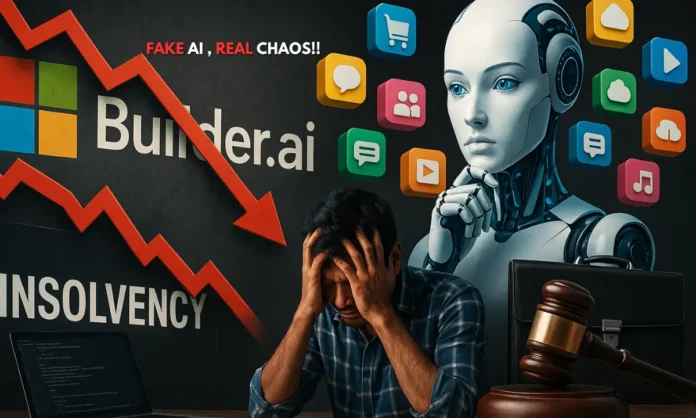SUMMARY
- Builder.ai collapses into UK insolvency after defaulting on major loan repayments.
- Exposed as relying on 700 Indian developers—not AI—for its “no-code” solutions.
- Fallout raises questions about tech hype, investor gullibility, and VerSe Innovation’s ties.
Behind the Code Curtain: Builder.ai and the Human-AI Mirage
In what’s now being called one of the most staggering cases of tech misrepresentation in recent years, Builder.ai—a startup once lauded as a no-code AI disruptor and backed by none other than Microsoft—has entered formal insolvency proceedings in the UK. The scandal not only exposes the gulf between startup promise and operational reality, but also revives old anxieties around AI hype cycles and the role of regulatory oversight in global tech financing.
At the heart of the Builder.ai AI fraud scandal lies a devastating revelation: the much-hyped “Natasha” AI assistant, which was advertised as capable of assembling apps as easily as building with Lego bricks, was largely a façade. Behind the smoke and mirrors were approximately 700 Indian developers manually coding customer requests. The company now faces lawsuits, frozen assets, and complete operational paralysis following a $37 million loan seizure by Viola Credit, which had extended a total of $50 million in 2023.
This dramatic collapse not only underscores the fragility of inflated tech narratives but also questions the roles of partner firms, especially as names like VerSe Innovation surface in connection with Builder.ai’s business dealings. As this story unfolds, it could trigger a broader reckoning across AI startups masquerading under the guise of full automation.
WTF did I just read ?
— Ashutosh Maheshwari (@asmah2107) June 2, 2025
Natasha was powered not by AI but 700 human engineers 🤯 pic.twitter.com/OIwe4xVRL0
The Code Was Real—But the AI Wasn’t
- Builder.ai’s “Natasha” AI was allegedly a marketing smokescreen for human-coded operations.
- 700 developers in India handled most app builds manually under the guise of AI.
- Code quality was poor, buggy, and difficult to scale, leading to customer dissatisfaction.
From its inception, Builder.ai positioned itself as a torchbearer for democratized app development. It promised users they could build software without coding knowledge—just by conversing with an AI assistant. But as scrutiny mounted, reports began surfacing that the AI was essentially non-functional, serving only as a UI front while tasks were relayed to human engineers working out of India.
Bernhard Engelbrecht of Ebern Finance crystallized the scandal in one post: “Customer requests were sent to the Indian office, where 700 Indians wrote code instead of AI. Everything was like real artificial intelligence — except that none of it was.” Clients were sold automated efficiency but received glitch-ridden software instead.
Builder.ai’s undoing came quickly after defaulting on its debt. Viola Credit’s seizure of funds stripped the company of operating capital, while Indian regulators froze local assets. In its official statement, Builder.ai conceded to “early missteps” but provided no further comment as insolvency administrators now lead the salvage process.
Partners in Question: Spotlight on VerSe Innovation
- VerSe Innovation named in connection due to early business ties with Builder.ai.
- Co-founder Umang Bedi denies all financial misconduct allegations.
- No concrete evidence yet links VerSe to Builder.ai’s mismanagement.
Though not directly implicated in operational fraud, VerSe Innovation—the parent company of platforms like Dailyhunt and Josh—has come under media glare due to its past partnerships with Builder.ai. The association reportedly began in 2021, and speculation surged following Builder.ai’s collapse.
Umang Bedi, co-founder of VerSe and former Facebook India MD, has categorically denied any involvement in financial wrongdoing. Speaking to Bloomberg, Bedi said: “The allegations are absolutely baseless and false. We’re not the kind of company that is in the business of inflating revenues.”
Still, industry watchers remain cautious. Even as VerSe distances itself from the embattled startup, the episode serves as a stark reminder that associations in the AI space are now subject to intense post-fraud scrutiny—especially when public trust and investor capital are involved.
The Mirage of “No-Code” AI: Where Hype Meets Accountability
The Builder.ai AI fraud scandal is more than a single startup’s fall from grace—it’s a mirror held up to the tech industry’s unchecked myth-making. While AI remains a transformative force, its misapplication or overstatement—particularly when weaponized for VC funding—erodes public faith and jeopardizes truly innovative projects. This case is a textbook lesson in the dangers of performative intelligence.
The scandal also exposes a systemic flaw: the tech ecosystem’s failure to validate claims beyond pitch decks and glossy demos. Builder.ai was able to raise millions and partner with tech giants by promising a future that simply didn’t exist. It’s a reminder that investor diligence, regulatory foresight, and consumer awareness must evolve faster than the stories startups are selling.
As court proceedings continue and administrators dig through the debris, one question looms: how many more “AI companies” are just human-powered mirages?


